新概念英语第二册Lesson40Food and talk课件(共48张PPT,无音频)
文档属性
| 名称 | 新概念英语第二册Lesson40Food and talk课件(共48张PPT,无音频) | 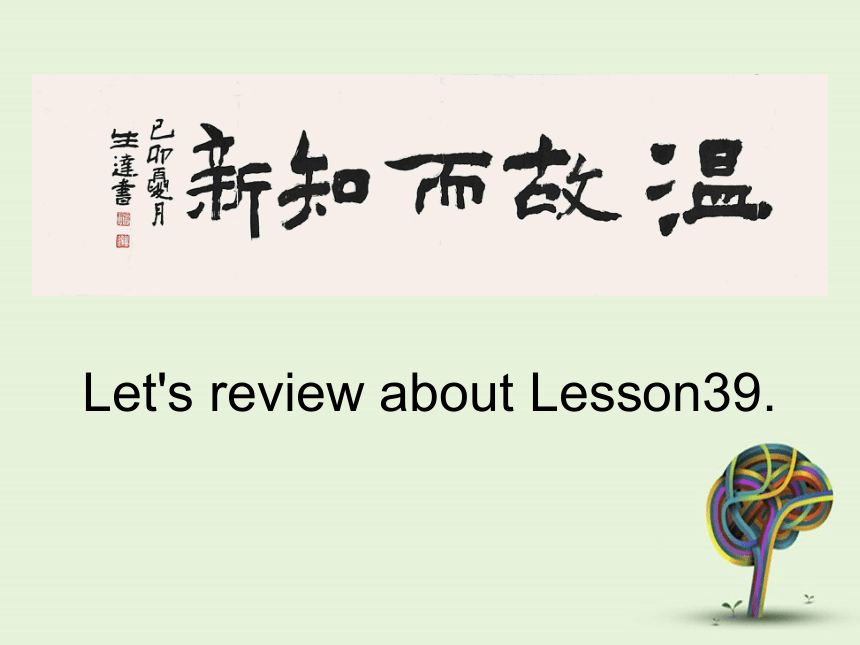 | |
| 格式 | pptx | ||
| 文件大小 | 1.7MB | ||
| 资源类型 | 教案 | ||
| 版本资源 | 新概念英语 | ||
| 科目 | 英语 | ||
| 更新时间 | 2023-12-24 16:36:21 | ||
图片预览

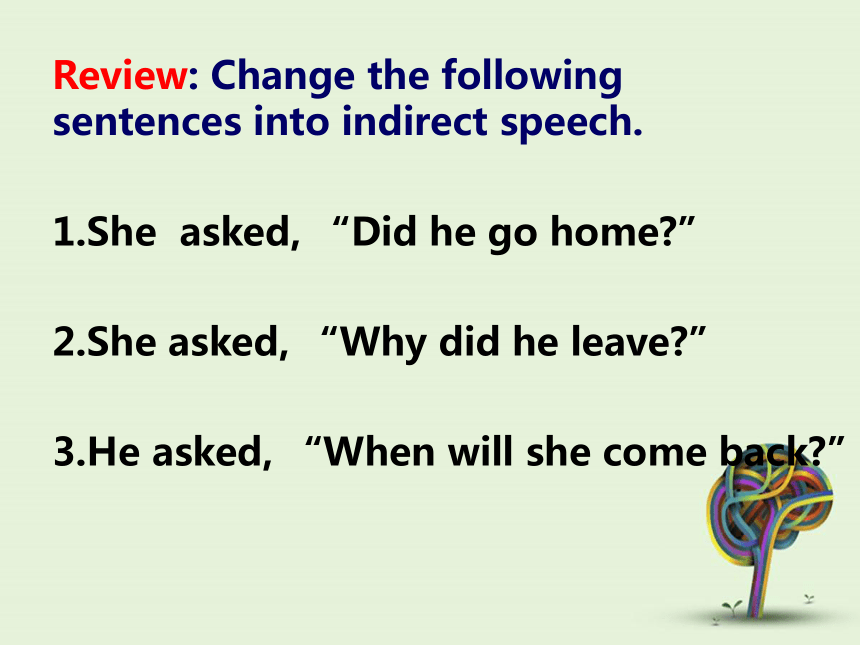
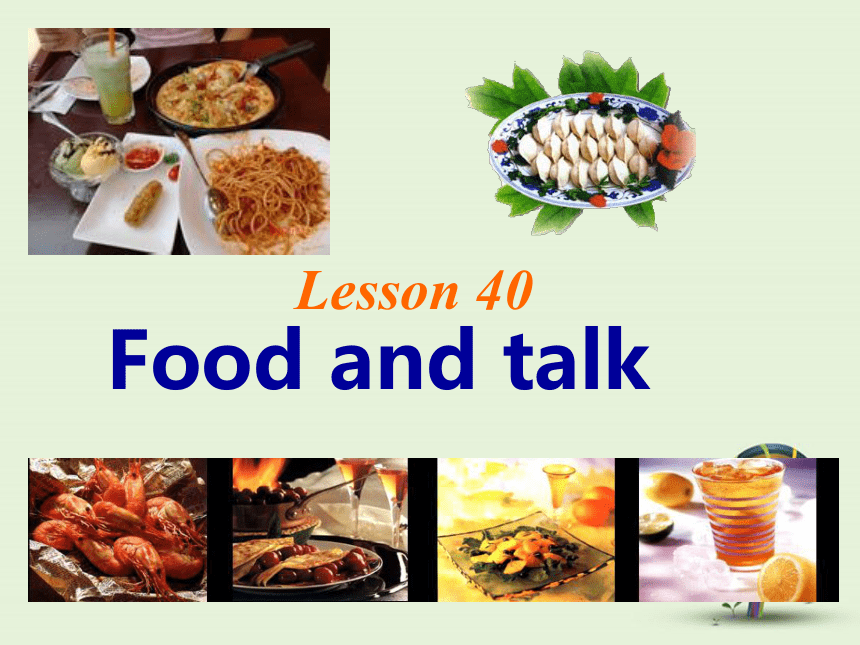
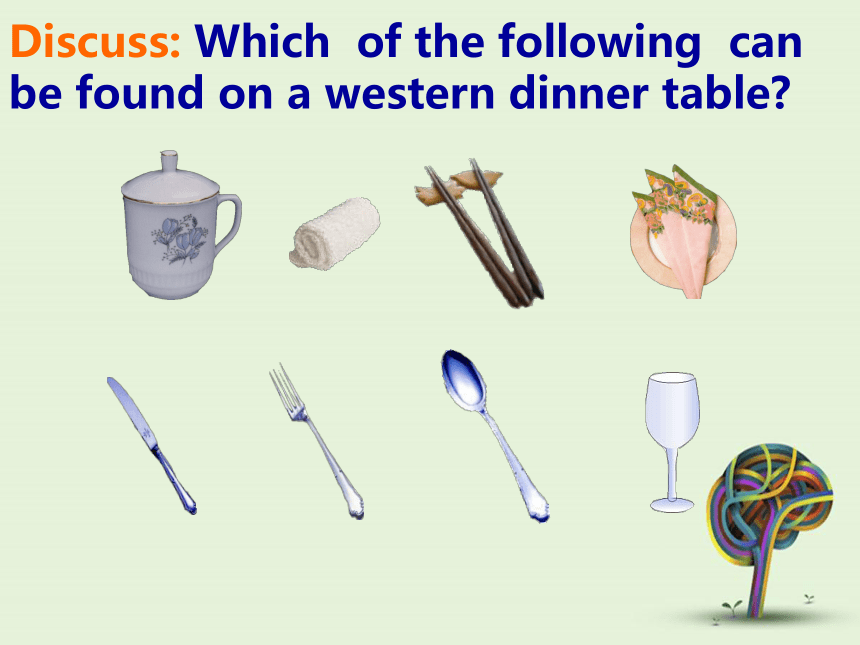
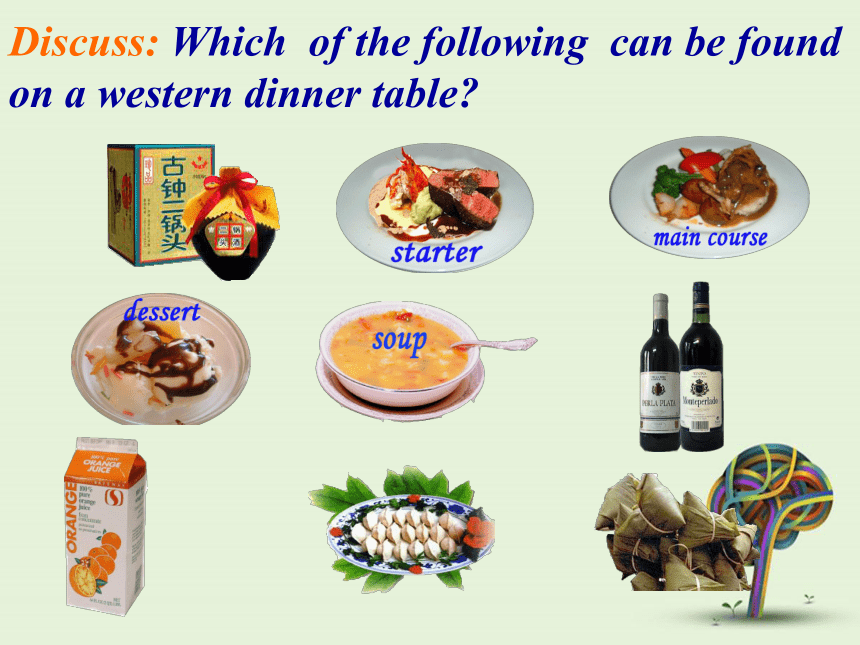
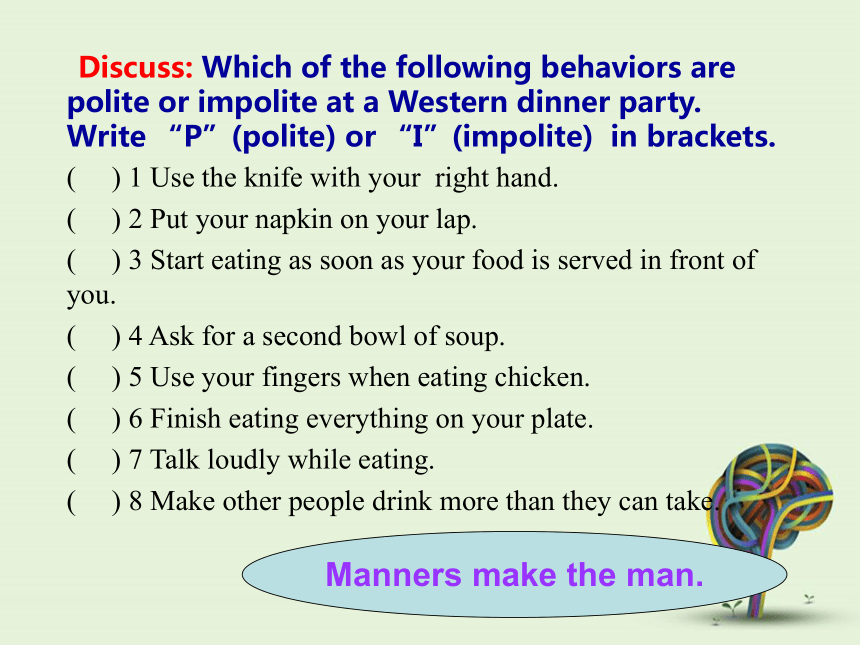
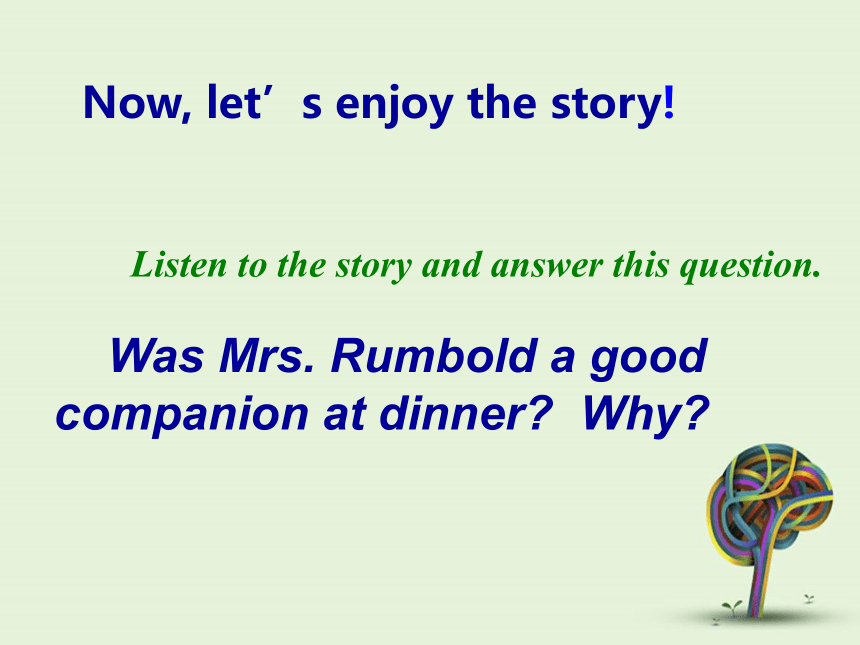
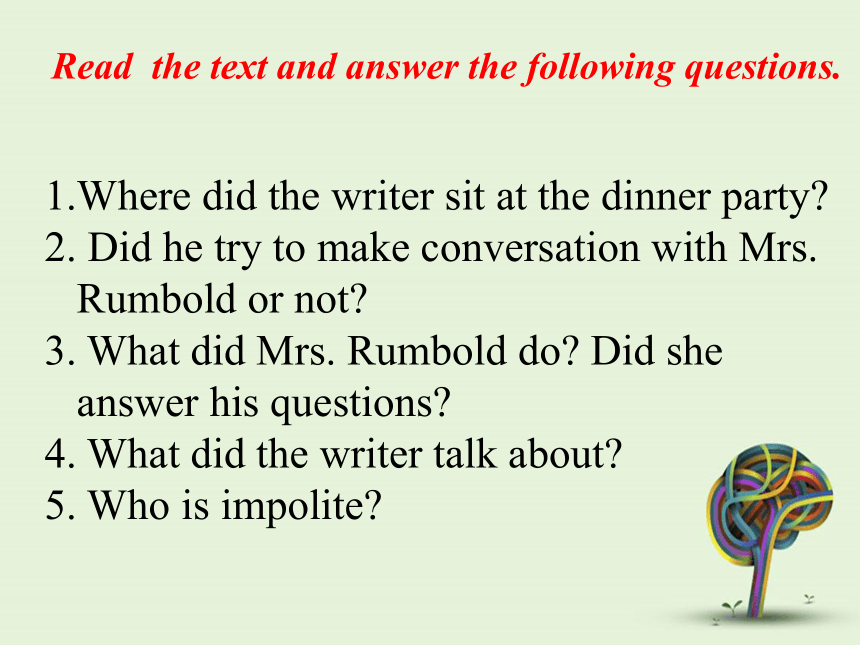
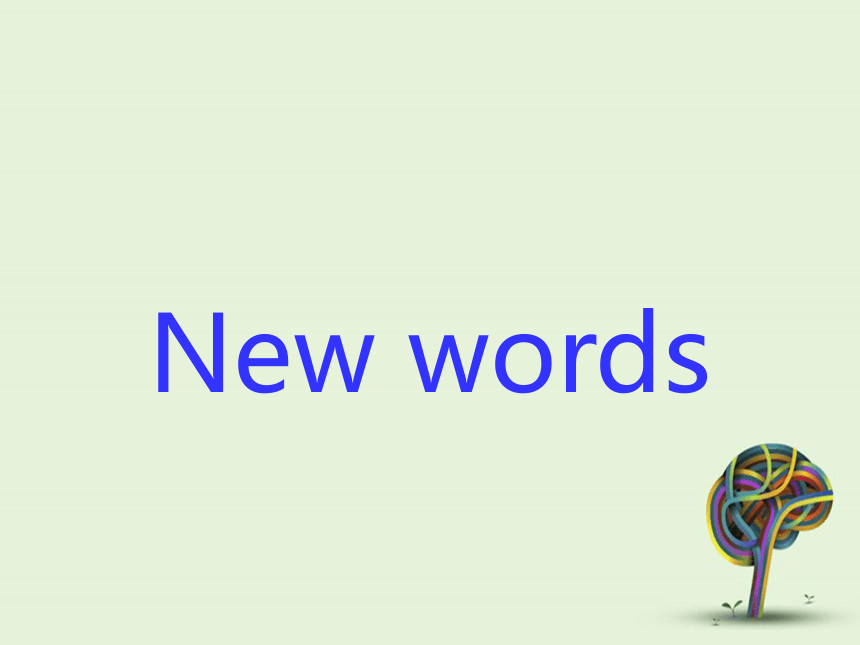
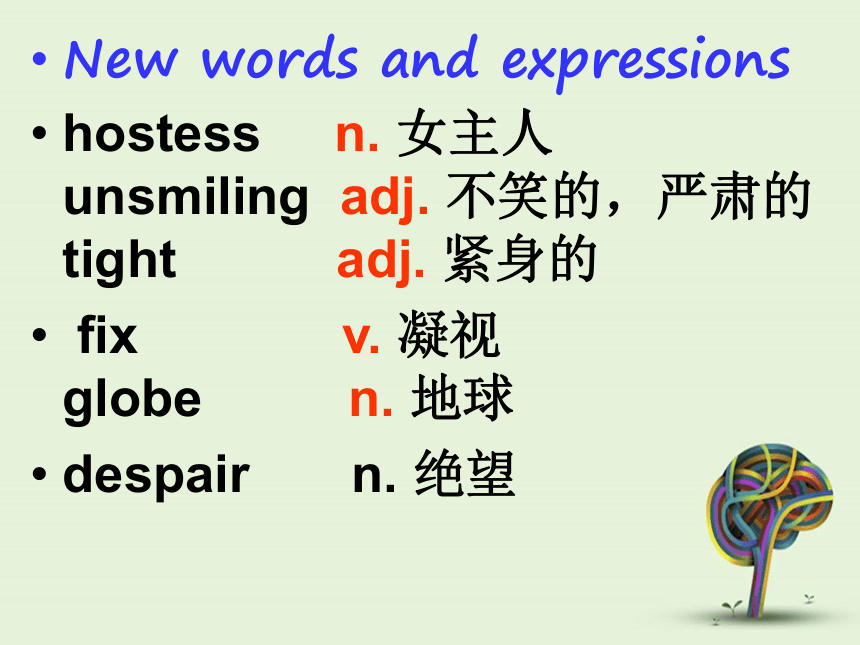
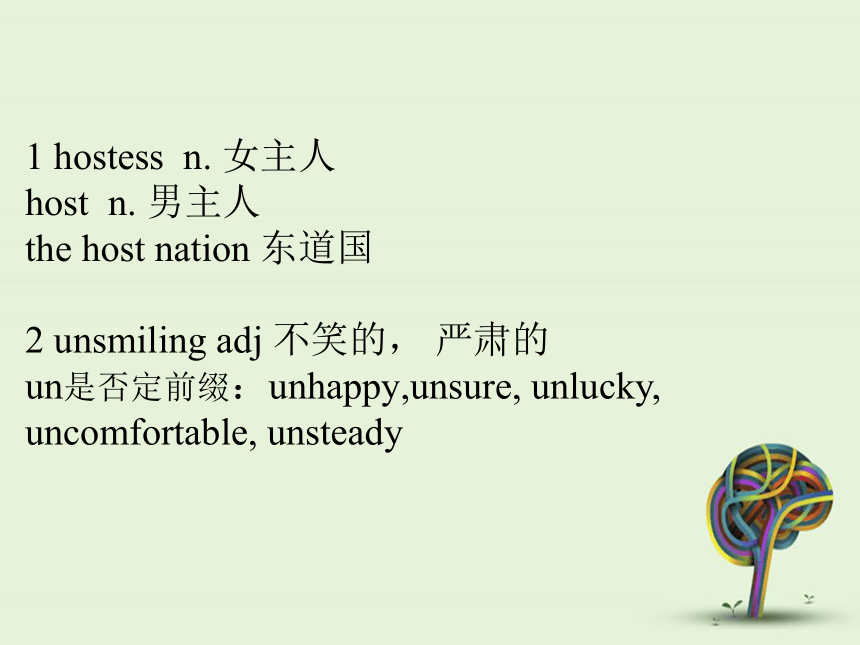
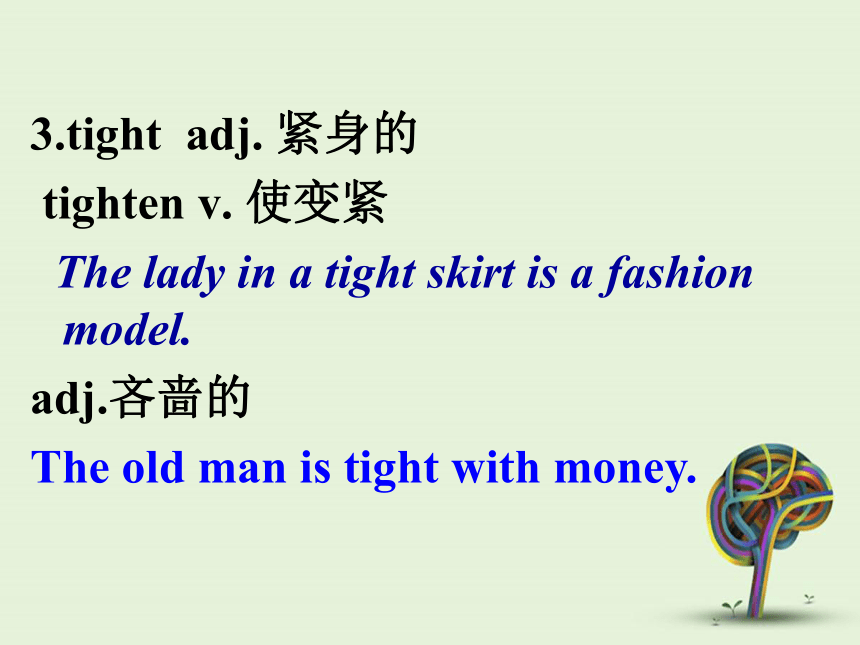
文档简介
(共48张PPT)
Let's review about Lesson39.
Review: Change the following sentences into indirect speech.
1.She asked, “Did he go home ”
2.She asked, “Why did he leave ”
3.He asked, “When will she come back ”
Lesson 40
Food and talk
Discuss: Which of the following can be found on a western dinner table
Discuss: Which of the following can be found on a western dinner table
Discuss: Which of the following behaviors are polite or impolite at a Western dinner party. Write “P”(polite) or “I”(impolite) in brackets.
( ) 1 Use the knife with your right hand.
( ) 2 Put your napkin on your lap.
( ) 3 Start eating as soon as your food is served in front of you.
( ) 4 Ask for a second bowl of soup.
( ) 5 Use your fingers when eating chicken.
( ) 6 Finish eating everything on your plate.
( ) 7 Talk loudly while eating.
( ) 8 Make other people drink more than they can take.
Manners make the man.
Now, let’s enjoy the story!
Was Mrs. Rumbold a good companion at dinner Why
Listen to the story and answer this question.
Where did the writer sit at the dinner party
Did he try to make conversation with Mrs. Rumbold or not
What did Mrs. Rumbold do Did she answer his questions
What did the writer talk about
Who is impolite
Read the text and answer the following questions.
New words
New words and expressions
hostess n. 女主人 unsmiling adj. 不笑的,严肃的
tight adj. 紧身的
fix v. 凝视
globe n. 地球
despair n. 绝望
1 hostess n. 女主人
host n. 男主人
the host nation 东道国
2 unsmiling adj 不笑的, 严肃的
un是否定前缀:unhappy,unsure, unlucky, uncomfortable, unsteady
3.tight adj. 紧身的
tighten v. 使变紧
The lady in a tight skirt is a fashion model.
adj.吝啬的
The old man is tight with money.
4.fix v.凝视;盯着
fix at =stare at=gaze at
The kid is fixing at his new toy.
vt.固定,安装
She fixed a handle on the door.
vt.修理
I am able to fix the computer.
5.globle n.地球
the globe village 地球村
adj. globlal
v. globalize 全球化
6.despair n.失望,绝望
phrase: in despair
She cried in despair.
vi.绝望,丧失信心
He despairs of winning a scholarship.
他已不抱赢得奖学金的希望了。
n. globalization
Text
Language points:
1.The hostess asked me to sit next to Mrs. Rumbold.
next to 在附近
More: beside, by, close to, near, nearby, etc.
The man next to me was drunk too much.
坐在我旁边的那个男人喝太多。
他们围着篝火在唱歌.
They sang songs by the campfire.
2.Her eyes were fixed on her plate and in a short time, she was busy eating.
be busy with sth 忙于某事
be busy doing sth 忙于做某事
be careful with sth 小心某事
be careful doing sth 小心做某事
He is busy washing clothes.
My brother is busy with his homework.
3. Mrs. Rumbold was a large, unsmiling lady in a tight black dress.
in在这里表示“穿什么衣服”(第17课学过) :
In the play, she must appear in a bright red dress and long black stockings.
4. She did not even look up when I took my seat beside her.
take a seat和take one’s seat都表示“让某人坐下”,比sit down更正式。
5. Her eyes were fixed on her plate and in a short time, she was busy eating. I tried to make conversation.
划线部分变为主动语态:She fixed her eyes on the plate.
fix v.
(1) 修理 ,相当于repair
I must get the radio fixed.
我必须请人把收音机修好。
(2) 使固定
He fixed the picture on the wall.
他把画固定在墙上。
The chair was fixed next to the desk.
椅子被固定在桌子旁边。
(3) 使…集中;盯着看
fix one’s eyes/attention on 使…集中;盯着看;注意;注视
She fixed her eyes on the clock.
她眼睛盯着钟看。
fix up 安排;解决;给…安排住处
6.“A new play is coming to ‘ The Globe’ soon,” I said. “Will you be seeing it ”
用现在进行时来表示接近的未来,“即将”。
We are leaving for Shanghai tomorrow.
(2) 用将来进行时来提问,尤其是提出问题但又不想迫使对方做出明确答复时,将来进行时可以显得比一般将来时will更委婉客气。
7. In despair, I asked her whether she was enjoying her dinner.
这里in despair是副词,表示“失望之中”。
e.g. I spent hours trying to fix the TV, but gave up in despair.
我花了几个小时修电视机,但是失望地放弃了。
8. ‘Young man,’ she answered, ‘if you ate more and talked less, we would both enjoy our dinner!’
这里If所引导的条件句的为主用eat和talk的过去时ate和talked,表示所假设的事情是与现在的已知事实相反。(实际上作者是吃的少,说的多。)主句也用过去时态,表示一种虚拟语气。这个内容将在后面深入学习。
at a dinner party /a meeting / a wedding/a concert
host / hostess
next to = beside
look up / look for/ look after/look around / look forward to/ look out / look out of
take/have one’s seat / sit down / be seated
be fixed on / upon
be busy doing sth. / with sth.
spend holidays
in despair
if you ate more and talked less, we would both enjoy our dinner. 虚拟
make 与 do 的词组及区别
Key structures
Special difficulties:
Special difficulties:
▲ make conversation 攀谈
make & do
make
a) Make 创造、 制作; 产生、生产
God made the world.
Bread is made from flour.
Don’t make so much noise.
b) 使役动词,表示 “使/让”, “make sb/sth do”:
The sun makes the plants grow.
c) 作出(某种举动),和某些名词连用时,意义上等于相应的动词:
make no difference make an effort
make a reply make a decision
make progress make conversation
make a promise make a plan make money
make a speech make the bed make one’s fortune make trouble
make a mistake make a journey/trip
make friends make up one’s mind
do
a)可以用来代替一些常用动词,如paint, study, wash, tidy, clean, comb, brush等,意思必须根据上下文内容和它的宾语来决定:
do the room do the dishes
do one’s hair do one’s nails
do one’s teeth do one’s best
do one’s duty do sb a favour
do odd jobs do business
do a painting/portrait
b) do(+ some/the)+ 动名词
do the cleaning do shopping
do the washing-up do some reading
if 引导的条件句
1.真实条件句:
对将来可能发生的事情的假设,主句中用将来时或祈使句,从句用现在时。主将从现
If he is out, I' ll call tomorrow.
You'll miss the train if you don' t hurry.
If I have time, I' ll write to him tomorrow.
Please don't disturb him if he is busy.
2.非真实条件句(虚拟语气)
在英语中语气分为三类:
陈述语气、祈使语气、虚拟语气。
虚拟语气:
如果我们所说的不是事实,也不是要求、命令、劝告等,而只是一种假设、愿望、建议或是一种实现不了的空想就用虚拟语气。
条件句
if条件句可分为两类:1.真实条件句,即假设的情况是会发生;2.非真实条件句,表示的是假设的情况(1)与事实相反,(2)不可能发生或发生的可能性极小,谓语用虚拟语气。
1.真实条件句
从句 主句
一般现在时 主+shall/will+v.原
If he comes, he will bring his bag.
条件句
2.非真实条件句(虚拟语气)
(1)与现在事实相反
从句 主句
一般过去时 主+should/would+v.原
If they were here, they would help me.
(2)与将来事实相反,或者将来不可能发生的
从句 主句
一般过去时 主+should/would+v.原
If it snowed tomorrowed,I would stay at home.
(3) 与过去事实相反:
从句 主句
过去完成时 should/would+have Ved
If he had got up earlier, he could have caught the train.
假如他早点起身的话,他本来能赶上那趟火车。
情景1:与现在事实相反
If…_________sth,… __________________ sth.
were/did
(过去式)
would/could/
might/should +do
(动词原形)
情景1:与现在事实相反
If I worked hard, I might have money.
If I had a lot of money, I could buy a ticket.
If I bought a ticket, I would be on board.
If I were on board, I should sail for America.
情景1:即学即练
如果我是你,我现在就去学英语。
如果他有时间,他就能去打篮球了。
情景2:与过去事实相反
If…_________sth,… __________________ sth.
had done
(过去完成)
would/could/might/should
have done
(现在完成)
情景2:与过去事实相反
If you had attended the meeting yesterday, you would\should have met her.
If the doctor had come last night, the boy could\might have been saved.
情景2:即学即练
如果你昨天看了那部电影,你就会记住那句话。
如果她不吃那么多糖,她就不用去拔牙了。
(pull out)
情景3:与将来事实可能相反的假设
If…_________ sth,… __________________ sth.
would/could/
might/should do(原形)
did (口语)
were to do (正式)
should do(万一)
情景3:
If I were to be twenty years old next year, I would
take the course of French.
If I won a lottery tomorrow, I might pass out at once.
If it should fail, I would try again.
情景3:即学即练
If I _______ (have) enough money some day, I____________ (buy) an island.
如果明天下雨,我就不参加聚会了。
Exercises:
1.The rice ______ if you had been more careful.
A. would not be burning B. would not burn
C. would not have burnt D. would not burnt
2.If my lawyer ____ here last Saturday, he ______ me from going.
A. had been ; would have prevented
B. had been ; would prevent
C. were ; would prevent
D. were ; would have prevented
3.I didn’t see your sister at the meeting. If she ______ she would have met my brother.
A. has come B. did come
C. came D. had come
4.______ for the free tickets, I would not have gone to the films so often.
A. If it is not B. Were it not
C. If it had not been D. If they have not
5.You didn’t let me drive. If we ______ in turn, you ______ so tired.
A. drove ; didn’t get
B. drove ; wouldn’t get
C. were driving ; wouldn’t get
D. had driven ; wouldn’t have got
6.If she had worked harder, she ______.
would succeed
B. had succeeded
C. should succeed
D. would have succeed
7. — If he ______, he ______ that food.
— Luckily he was sent to the hospital immediately.
A. was warned ; would not take
B. had been warned ; would not have taken
C. would be warned ; had not taken
D. would have been warned ; had not taken
8.If it ______ tomorrow, they would not go there by bike.
A. will rain B. rains
C. would rain D. should rain
9.If I ______ you, I would not do it.
A. am B. were C. shall be D. being
Goodbye
Let's review about Lesson39.
Review: Change the following sentences into indirect speech.
1.She asked, “Did he go home ”
2.She asked, “Why did he leave ”
3.He asked, “When will she come back ”
Lesson 40
Food and talk
Discuss: Which of the following can be found on a western dinner table
Discuss: Which of the following can be found on a western dinner table
Discuss: Which of the following behaviors are polite or impolite at a Western dinner party. Write “P”(polite) or “I”(impolite) in brackets.
( ) 1 Use the knife with your right hand.
( ) 2 Put your napkin on your lap.
( ) 3 Start eating as soon as your food is served in front of you.
( ) 4 Ask for a second bowl of soup.
( ) 5 Use your fingers when eating chicken.
( ) 6 Finish eating everything on your plate.
( ) 7 Talk loudly while eating.
( ) 8 Make other people drink more than they can take.
Manners make the man.
Now, let’s enjoy the story!
Was Mrs. Rumbold a good companion at dinner Why
Listen to the story and answer this question.
Where did the writer sit at the dinner party
Did he try to make conversation with Mrs. Rumbold or not
What did Mrs. Rumbold do Did she answer his questions
What did the writer talk about
Who is impolite
Read the text and answer the following questions.
New words
New words and expressions
hostess n. 女主人 unsmiling adj. 不笑的,严肃的
tight adj. 紧身的
fix v. 凝视
globe n. 地球
despair n. 绝望
1 hostess n. 女主人
host n. 男主人
the host nation 东道国
2 unsmiling adj 不笑的, 严肃的
un是否定前缀:unhappy,unsure, unlucky, uncomfortable, unsteady
3.tight adj. 紧身的
tighten v. 使变紧
The lady in a tight skirt is a fashion model.
adj.吝啬的
The old man is tight with money.
4.fix v.凝视;盯着
fix at =stare at=gaze at
The kid is fixing at his new toy.
vt.固定,安装
She fixed a handle on the door.
vt.修理
I am able to fix the computer.
5.globle n.地球
the globe village 地球村
adj. globlal
v. globalize 全球化
6.despair n.失望,绝望
phrase: in despair
She cried in despair.
vi.绝望,丧失信心
He despairs of winning a scholarship.
他已不抱赢得奖学金的希望了。
n. globalization
Text
Language points:
1.The hostess asked me to sit next to Mrs. Rumbold.
next to 在附近
More: beside, by, close to, near, nearby, etc.
The man next to me was drunk too much.
坐在我旁边的那个男人喝太多。
他们围着篝火在唱歌.
They sang songs by the campfire.
2.Her eyes were fixed on her plate and in a short time, she was busy eating.
be busy with sth 忙于某事
be busy doing sth 忙于做某事
be careful with sth 小心某事
be careful doing sth 小心做某事
He is busy washing clothes.
My brother is busy with his homework.
3. Mrs. Rumbold was a large, unsmiling lady in a tight black dress.
in在这里表示“穿什么衣服”(第17课学过) :
In the play, she must appear in a bright red dress and long black stockings.
4. She did not even look up when I took my seat beside her.
take a seat和take one’s seat都表示“让某人坐下”,比sit down更正式。
5. Her eyes were fixed on her plate and in a short time, she was busy eating. I tried to make conversation.
划线部分变为主动语态:She fixed her eyes on the plate.
fix v.
(1) 修理 ,相当于repair
I must get the radio fixed.
我必须请人把收音机修好。
(2) 使固定
He fixed the picture on the wall.
他把画固定在墙上。
The chair was fixed next to the desk.
椅子被固定在桌子旁边。
(3) 使…集中;盯着看
fix one’s eyes/attention on 使…集中;盯着看;注意;注视
She fixed her eyes on the clock.
她眼睛盯着钟看。
fix up 安排;解决;给…安排住处
6.“A new play is coming to ‘ The Globe’ soon,” I said. “Will you be seeing it ”
用现在进行时来表示接近的未来,“即将”。
We are leaving for Shanghai tomorrow.
(2) 用将来进行时来提问,尤其是提出问题但又不想迫使对方做出明确答复时,将来进行时可以显得比一般将来时will更委婉客气。
7. In despair, I asked her whether she was enjoying her dinner.
这里in despair是副词,表示“失望之中”。
e.g. I spent hours trying to fix the TV, but gave up in despair.
我花了几个小时修电视机,但是失望地放弃了。
8. ‘Young man,’ she answered, ‘if you ate more and talked less, we would both enjoy our dinner!’
这里If所引导的条件句的为主用eat和talk的过去时ate和talked,表示所假设的事情是与现在的已知事实相反。(实际上作者是吃的少,说的多。)主句也用过去时态,表示一种虚拟语气。这个内容将在后面深入学习。
at a dinner party /a meeting / a wedding/a concert
host / hostess
next to = beside
look up / look for/ look after/look around / look forward to/ look out / look out of
take/have one’s seat / sit down / be seated
be fixed on / upon
be busy doing sth. / with sth.
spend holidays
in despair
if you ate more and talked less, we would both enjoy our dinner. 虚拟
make 与 do 的词组及区别
Key structures
Special difficulties:
Special difficulties:
▲ make conversation 攀谈
make & do
make
a) Make 创造、 制作; 产生、生产
God made the world.
Bread is made from flour.
Don’t make so much noise.
b) 使役动词,表示 “使/让”, “make sb/sth do”:
The sun makes the plants grow.
c) 作出(某种举动),和某些名词连用时,意义上等于相应的动词:
make no difference make an effort
make a reply make a decision
make progress make conversation
make a promise make a plan make money
make a speech make the bed make one’s fortune make trouble
make a mistake make a journey/trip
make friends make up one’s mind
do
a)可以用来代替一些常用动词,如paint, study, wash, tidy, clean, comb, brush等,意思必须根据上下文内容和它的宾语来决定:
do the room do the dishes
do one’s hair do one’s nails
do one’s teeth do one’s best
do one’s duty do sb a favour
do odd jobs do business
do a painting/portrait
b) do(+ some/the)+ 动名词
do the cleaning do shopping
do the washing-up do some reading
if 引导的条件句
1.真实条件句:
对将来可能发生的事情的假设,主句中用将来时或祈使句,从句用现在时。主将从现
If he is out, I' ll call tomorrow.
You'll miss the train if you don' t hurry.
If I have time, I' ll write to him tomorrow.
Please don't disturb him if he is busy.
2.非真实条件句(虚拟语气)
在英语中语气分为三类:
陈述语气、祈使语气、虚拟语气。
虚拟语气:
如果我们所说的不是事实,也不是要求、命令、劝告等,而只是一种假设、愿望、建议或是一种实现不了的空想就用虚拟语气。
条件句
if条件句可分为两类:1.真实条件句,即假设的情况是会发生;2.非真实条件句,表示的是假设的情况(1)与事实相反,(2)不可能发生或发生的可能性极小,谓语用虚拟语气。
1.真实条件句
从句 主句
一般现在时 主+shall/will+v.原
If he comes, he will bring his bag.
条件句
2.非真实条件句(虚拟语气)
(1)与现在事实相反
从句 主句
一般过去时 主+should/would+v.原
If they were here, they would help me.
(2)与将来事实相反,或者将来不可能发生的
从句 主句
一般过去时 主+should/would+v.原
If it snowed tomorrowed,I would stay at home.
(3) 与过去事实相反:
从句 主句
过去完成时 should/would+have Ved
If he had got up earlier, he could have caught the train.
假如他早点起身的话,他本来能赶上那趟火车。
情景1:与现在事实相反
If…_________sth,… __________________ sth.
were/did
(过去式)
would/could/
might/should +do
(动词原形)
情景1:与现在事实相反
If I worked hard, I might have money.
If I had a lot of money, I could buy a ticket.
If I bought a ticket, I would be on board.
If I were on board, I should sail for America.
情景1:即学即练
如果我是你,我现在就去学英语。
如果他有时间,他就能去打篮球了。
情景2:与过去事实相反
If…_________sth,… __________________ sth.
had done
(过去完成)
would/could/might/should
have done
(现在完成)
情景2:与过去事实相反
If you had attended the meeting yesterday, you would\should have met her.
If the doctor had come last night, the boy could\might have been saved.
情景2:即学即练
如果你昨天看了那部电影,你就会记住那句话。
如果她不吃那么多糖,她就不用去拔牙了。
(pull out)
情景3:与将来事实可能相反的假设
If…_________ sth,… __________________ sth.
would/could/
might/should do(原形)
did (口语)
were to do (正式)
should do(万一)
情景3:
If I were to be twenty years old next year, I would
take the course of French.
If I won a lottery tomorrow, I might pass out at once.
If it should fail, I would try again.
情景3:即学即练
If I _______ (have) enough money some day, I____________ (buy) an island.
如果明天下雨,我就不参加聚会了。
Exercises:
1.The rice ______ if you had been more careful.
A. would not be burning B. would not burn
C. would not have burnt D. would not burnt
2.If my lawyer ____ here last Saturday, he ______ me from going.
A. had been ; would have prevented
B. had been ; would prevent
C. were ; would prevent
D. were ; would have prevented
3.I didn’t see your sister at the meeting. If she ______ she would have met my brother.
A. has come B. did come
C. came D. had come
4.______ for the free tickets, I would not have gone to the films so often.
A. If it is not B. Were it not
C. If it had not been D. If they have not
5.You didn’t let me drive. If we ______ in turn, you ______ so tired.
A. drove ; didn’t get
B. drove ; wouldn’t get
C. were driving ; wouldn’t get
D. had driven ; wouldn’t have got
6.If she had worked harder, she ______.
would succeed
B. had succeeded
C. should succeed
D. would have succeed
7. — If he ______, he ______ that food.
— Luckily he was sent to the hospital immediately.
A. was warned ; would not take
B. had been warned ; would not have taken
C. would be warned ; had not taken
D. would have been warned ; had not taken
8.If it ______ tomorrow, they would not go there by bike.
A. will rain B. rains
C. would rain D. should rain
9.If I ______ you, I would not do it.
A. am B. were C. shall be D. being
Goodbye
同课章节目录
